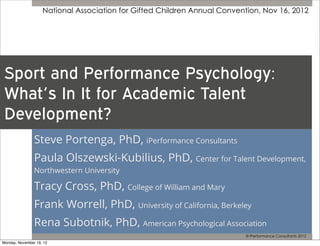
Performance psych for gifted kids
- 1. National Association for Gifted Children Annual Convention, Nov 16, 2012 Sport and Performance Psychology: What’s In It for Academic Talent Development? Steve Portenga, PhD, iPerformance Consultants Paula Olszewski-Kubilius, PhD, Center for Talent Development, Northwestern University Tracy Cross, PhD, College of William and Mary Frank Worrell, PhD, University of California, Berkeley Rena Subotnik, PhD, American Psychological Association © iPerformance Consultants 2012 Monday, November 19, 12
- 2. Long-Term Athlete Development Optimal training, competition, and recovery programming with relation to biological development and maturation © iPerformance Consultants 2012 Monday, November 19, 12
- 3. “You can’t make the grass grow faster by pulling on the blades” African Proverb Monday, November 19, 12
- 4. This starts with you! Monday, November 19, 12
- 5. Build overall motor skills Learn all fundamental sport skills Build the ‘engine’ and consolidate sport-specific skills Fine-tune the ‘engine,’ skills, and performance Maximize performance, skills, and ‘engine’ © iPerformance Consultants 2012 Monday, November 19, 12
- 6. © iPerformance Consultants 2012 Monday, November 19, 12
- 7. © iPerformance Consultants 2012 Monday, November 19, 12
- 8. © iPerformance Consultants 2012 Monday, November 19, 12
- 9. The 10 year rule It takes 10 years of extensive practice to excel in anything ! 10 year or 10 000 hour rule (Ericsson and Charness, 1994) For the athlete and coach this translates as slightly more than three hours of deliberate practice daily for 10 years © iPerformance Consultants 2012 Monday, November 19, 12
- 10. Chronological/Biological age vs. Developmental age Typically training and competition is based on chronological age Athletes can be 4-5 years apart by maturation level © iPerformance Consultants 2012 Monday, November 19, 12
- 11. Introduction to the Psychology of Performance © iPerformance Consultants 2012 Monday, November 19, 12
- 12. The Mental Side of Sports Sports are NOT 90% mental! But the head is the gatekeeper to the body There are no shortcuts, quick fixes, or pixie dust © iPerformance Consultants 2012 Monday, November 19, 12
- 13. It is • Confidence • Concentration What is FOCUS? • Composure • Poised • Courage It’s WAY MORE than just • Commitment CONCENTRATION! • Resilient This is the wellspring of • Totally in the moment FLOW! • Ready • Engaged • Control • Choice… And it’s COOL!!! Monday, November 19, 12
- 14. Competitiveness Competitiveness is having the natural or developed psychological edge that enables you to: Generally, cope better than your opponents with the many demands (competition, training, lifestyle) that sport places on a performer. Specifically, be more consistent and better than your opponents in remaining determined, confident, and in control under pressure. (Jones, Hanton, & Connaughton, 2002) © iPerformance Consultants 2012 Monday, November 19, 12
- 15. Performance Psychology Skills © iPerformance Consultants 2012 Monday, November 19, 12
- 16. Cool under cabin pressure. PREPARATION Concentration: Prepare Deliberately Monday, November 19, 12
- 17. Prepare Deliberately The major difference between experts and amateurs is the capability to deliberately practice “The practice, in itself, is nothing special; the care and consistency with which it is made is” (Chambliss, 1989) The difference between expert and amateurs’ practice has more to do with the quality of training than the quantity © iPerformance Consultants 2012 Monday, November 19, 12
- 18. Prepare Deliberately Coaches and parents: • Need to help younger athletes learn how to practice effectively • Teach discipline; “If you’re going to do it, learn to do it right” • Challenge on a daily basis and celebrate small improvements © iPerformance Consultants 2012 Monday, November 19, 12
- 20. Developing achievement motivation Four key questions 1.Can I succeed? 2.Do I even care about this? 3.Why do I want to succeed? What defines “success?” 4.What do I have to do to succeed? © iPerformance Consultants 2012 Monday, November 19, 12
- 21. Why do I want to succeed? Three basic human needs • The need for autonomy • The need for competence • The need for relatedness Autonomous motivation: goals connected to personal interests/values Controlled motivation: goals based on external or internal pressures © iPerformance Consultants 2012 Monday, November 19, 12
- 23. Confidence A sense of “pre-knowing” that you CAN deliver, that you WILL deliver, and that you will SUCCEED! Surely it is preferred over … Doubt…Worry…Anxiety…Fear There are two basic principles for experiencing confidence, and they each require the individual to make a personal choice. © iPerformance Consultants 2012 Monday, November 19, 12
- 24. Competence Builds Confidence Focus confidence on the performance, not the outcome © iPerformance Consultants 2012 Monday, November 19, 12
- 25. Composure: React Adaptively to Distractions Monday, November 19, 12
- 26. Adaptive Reactions to Distractions To develop in youth: 1. Give them lots of experiences to learn from 2. Teach achievement comes from effort, not inborn abilities 3. Encourage them to believe that they can turn adversity into opportunity 4. Highlight times when they do so! Turn stress into a problem to be solved: Do not cope by avoiding • Ask: “How could it be better or worse?” • Then take action to make it better © iPerformance Consultants 2012 Monday, November 19, 12
- 27. Panel Reactions © iPerformance Consultants 2012 Monday, November 19, 12
- 28. Questions? steve@iperformanceconsultants.com © iPerformance Consultants 2012 Monday, November 19, 12
